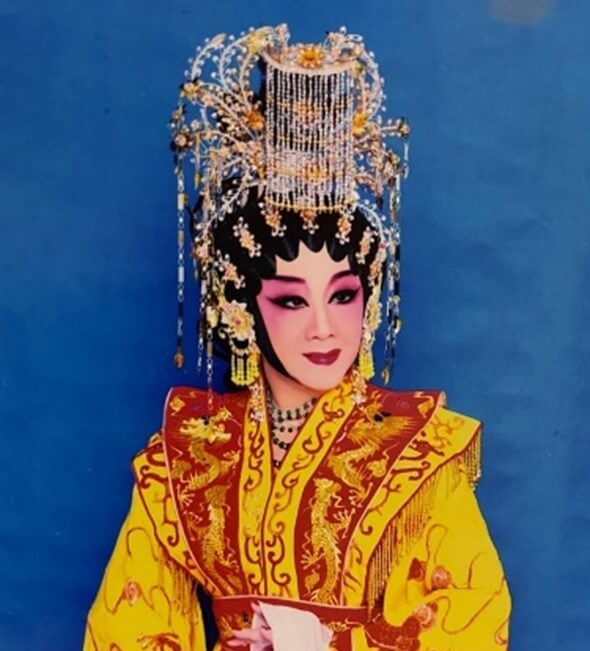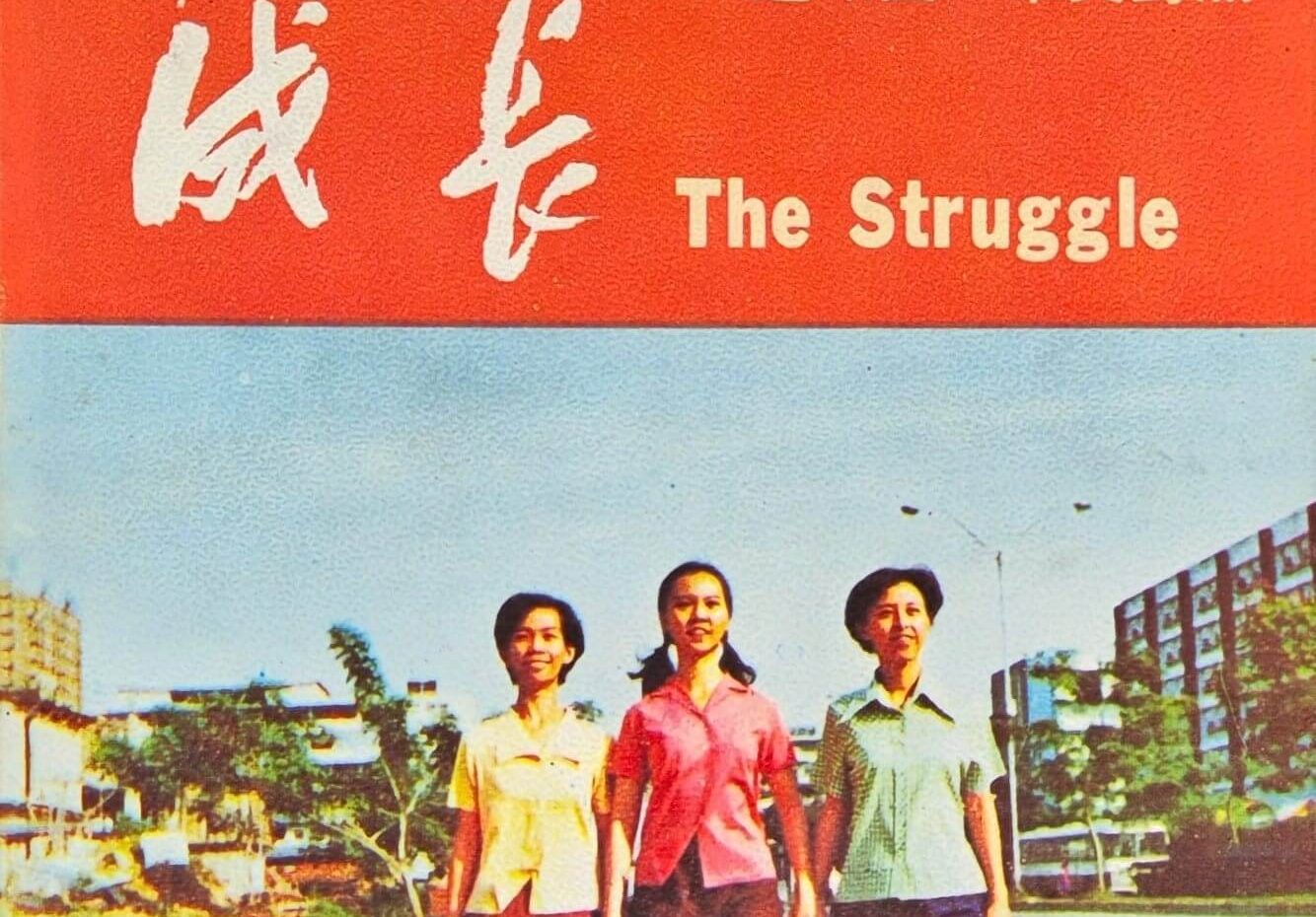Peking opera in Singapore
When Peking opera first arrived in Singapore at the end of the 19th century, it was still referred to as “Fuzhou opera”. This could have been a reference to the Fuzhou opera troupe (circa 1910) that was invited to perform at the Heng Seng Peng theatre in Singapore not long after it was completed.
According to the book Zhongguo Jingju shi (History of Chinese Peking Opera), “Originally, Fuzhou’s Peking opera was not much different from the original Peking opera. However, at the time, the people of Singapore did not know what Peking opera was, so they all called it ‘Fuzhou opera’. It was not until shortly after the war that it was renamed ‘Peking opera’.”1
As for when Peking opera first appeared in Singapore, Wang Fang suggests in Jingju zai Xinjiapo (Peking Opera in Singapore) that it happened between 27 December 1893 and 6 January 1894, when the Fuxiangsheng Peking Opera Troupe from Fuzhou in Fujian, China, performed in Singapore.2
Earliest Peking opera performances
Another early performance of Peking opera in Singapore was documented in 1910. According to Yi Yan, “Chen Xin Guan, the troupe leader of Xinxianghe Fuzhou Opera Troupe at the Heng Seng Peng theatre, hired more than 80 Peking opera performers from Xiamen to complement the original cast. They sometimes performed together on stage, and sometimes presented Peking opera during the day and Fuzhou opera at night.”3
In 1922, in an initiative by Heng Seng Peng’s new stage troupe leader, artistes Lei Wenguang (1867–1926), Liu Changsong (1899–1987), Ming Yuezhu and others were invited from southern China to lead a troupe to perform in Singapore.4Others in this early group of actors, who played different roles, included: Xiaoguifen, who portrayed elderly male characters; Shisandan (born Hou Junshan, 1854–1935), who played young female characters; Zhou Yueying, portraying female warriors; Mei Fengchun and Wang Qilin, actresses portraying young male characters; Guo Fengxian, an actress playing a martial role, Fu Zhengkui, who played male characters with painted faces, and actress Shisihong.5
In 1932, amusement park Great World built a Peking opera stage. A group of Bangzi opera performers, including Jin Haitang, subsequently joined Great World, making the switch to Peking opera.6 Most Peking opera performances took place in formal theatres rather than in outdoor ones, but Great World was an exception to this trend.
On 5 October 1941, the Chang Chou General Association Beijing Opera Group hosted a charity performance at the Thian Hock Keng Temple to support the British Army during the Pacific War, featuring Peking opera plays Xiao Yao Jin, Yellow Crane Tower, and Lianhua Nunnery. The locally renowned artist Hor Chim Or (1920–2021) played Zhang Fei in Yellow Crane Tower.7
From 30 November to 1 December 1946, the Chang Chow General Association’s (formerly known as the Chang Chow Ten Clan Association) Pingju troupe held a public performance at the Thian Hock Keng Temple as well. The repertoire included full-length plays such as The Heroes’ Gathering, Zhulian Village, Empty City Strategy, and Dumu Pass, among others.8
In 1947, the renowned martial artist Liu Changsong, along with his son Liu Songhe and other martial arts performers, joined the Xiaoguanghan Drama Society. They performed martial arts plays such as Money Leopard, White Waterside, Jindaozhen, A Grudge Settled with One Arrow, and others at Great World, causing a sensation.9
Local Peking opera performance groups
Early Peking opera groups in Singapore included the Huanan Pingju Society, the Chang Chow General Association Pingju Department, the Nanlu Club Pingju Group, the Xiamen Association Pingju Group, the Huabei Association Pingju Group, the Chang Chow Ten Clan Association Pingju Group, the Xiaoguanghan Drama Society, and other small-scale Peking opera organisations,10 all of which were once very active. The aforementioned Hor Chim Or, who also played the role of Zhang Fei in his early years in The Marsh of Reed Flowers, often performed during charity events organised by the Chang Chow Association.
Established in 1940, Ping Sheh is the oldest Peking opera troupe in Singapore’s history. The term pingju originated from the word ping in Beiping City during the Republic of China era. After the establishment of the People’s Republic of China, it became commonly referred to as jingju (Beijing opera) instead when Beiping was renamed Beijing. Ping Sheh, having been born during the era when Beiping was still in existence, was thus named accordingly.11
According to Wang Fang’s research, Ping Sheh was officially registered in 1941,12although it had already organised two large-scale charity performances at Tien Yien Moh Toi, also known as the Palace Theatre (now known as The Majestic), in 1937. Its president Lim Keng Lian personally took the stage, leading by example in contributing to charity efforts.13Han Dynasty Su Wu remains one of Ping Sheh’s most representative plays, starring Yim Chong Seng as Su Wu and Xu Hong as Hu Ayun.
Ping Sheh’s founders included Lim Keng Lian (1893–1968), Toh Keng Tuan (1913–1966), Li Zelun (1900s–1979), Lim Bo Seng (1909–1944), and others. After the outbreak of the Pacific War in 1941, President Lim retreated to Chongqing, China. The members of the society dispersed, and Ping Sheh was temporarily dissolved.14Since its revival in 1945, however, Ping Sheh has been very active, staging numerous large-scale productions such as Shepherd Su Wu.

In early 2023, the new leadership team that took over Ping Sheh completely revitalised the organisation’s hardware and software. All its performers, from old to young, were well-prepared to take the stage in the four main roles of Peking opera: sheng (male), dan (female), jing (painted face), and chou (clown). They continued on the path of promoting and passing on traditional Chinese culture.
In 1992, Tian Yun Amateur Peking Opera Troupe was established. Its founders included Hor Chim Or, Tay Kim Woo, Chua Kok Lim (1928–2013), Mao Wei, Lim Teck Pin, Loo Teck Ming, Lim Mei Lian, Kor Khoon, Han Yin Juan, and others. Hor served as its first president for 13 years,15before Loo, a graduate of Dunman High School, took over in 2005, holding the position to this day.
In 1994, Tian Yun Amateur Peking Opera Troupe began teaching Peking opera at Dunman High School, injecting new blood into the society at the same time. As a result, it became a relatively young troupe. It has staged large-scale productions since then, including Premier Liu Luo Guo: Ode to the Plum Blossom, Judge Xu’s Promotion, and Wang Xi Feng.
The most notable play by Tian Yun Amateur Peking Opera Troupe is Premier Liu Luo Guo: Ode to the Plum Blossom. Originally created by the Beijing Peking Opera Theatre, it has been staged three times by Tian Yun Amateur Peking Opera Troupe in 2009, 2010, and 2019. The response was positive, and audiences felt that light-hearted comedies such as this were suitable for all ages and should be preserved as part of the standard repertoire.

A group of highly-educated middle-aged and young actors with rich stage experience has emerged as future successors of Tian Yun Amateur Peking Opera Troupe. With the team’s rejuvenation and the diversification of repertoire, the troupe is moving towards attracting younger audiences and people from different ethnic groups.
Another local Peking opera troupe established in 1983 was the Leling Beijing Opera Troupe, founded by Goh Siew Geok and Huang Houjian.16Prior to that, Goh had entered the Huanan Pingju Society at the age of 12 and later joined Ping Sheh. The troupe was renamed TAS Theatre in 1993.17
Notable figures of local Peking opera
With the merger of Huanan Pingju Society and Ping Sheh, veteran artists in the local Peking opera scene included Su Ziqian, Liu Fushan (circa 1902–1974), Liu Changsong, Zhao Meiling (circa 1914–2016), Wang Yunxia, Phan Wait Hong (1914–2016), Wu Chunfu, Lin Laixi, Cao Yanqin, and Qian Jiechu (huqin player).
Most cultural enthusiasts in Singapore would have been no stranger to Hor Chim Or, who not only worked as a journalist but was also a national basketball player. His passion for Peking opera from a young age led him to study martial arts and stagecraft under figures such as Zhang Helou (unknown–1960s) and Liu Changsong. At the age of 18, Hor made his debut performance in Peking opera with the play Nanyang Pass. In his later years, he, along with like-minded individuals such as Tay Kim Woo, departed from Ping Sheh and co-founded the Tian Yun Amateur Peking Opera Troupe.
Another important figure is Phan Wait Hong, who received the Singapore Cultural Medallion in 1992. Born Zhao Lanzhen, she lived in Shanghai before the age of 14. As a child, she disliked studying and reading but had a passion for singing Peking opera. When the opportunity presented itself, she travelled by boat to Singapore with the Caifeng She to perform and became an instant hit after singing at the Nam Tin Restaurant.18
In its early days, Nam Tin Restaurant (now Yue Hwa Building) had a top-floor teahouse where the wealthy could enjoy Peking opera. The audience only had to pay for tea to enjoy the entire evening’s entertainment. Phan made her debut there after joining Ping Sheh. Later, when Tian Yun Amateur Peking Opera Troupe was established, she was active in both organisations.

This is an edited and translated version of 新加坡京剧. Click here to read original piece.
| 1 | Beijing Arts Institute and Shanghai Arts Institute, Zhongguo jingju shi, 205. |
| 2 | Wang Fang, Jingju zai xinjiapo, 29. |
| 3 | Yi Yan, Liyuan shiji: Xinjiapo huazu difang xiqu zhi lu, 53. |
| 4 | Shen Jihua, Edward Seah trans., Good chance, Hor Chim Or: Tracing the life of Hor Chim Or, 92. |
| 5 | Wang, Jingju zai Xinjiapo, 37. The birth and death years of several actors are unknown. |
| 6 | Wang, Jingju zai Xinjiapo, 43. |
| 7 | Yi, Liyuan shiji, 489. |
| 8 | Yi, Liyuan shiji, 489–490. |
| 9 | Yi, Liyuan shiji, 491. |
| 10 | Wang, Jingju zai Xinjiapo, 61–63. |
| 11 | Shen, Good Luck, Hor Chim Or, 106–107. |
| 12 | Wang, Jingju zai Xinjiapo, 56–59. |
| 13 | Yi, Liyuan shiji, 488. |
| 14 | Yi, Liyuan shiji, 62. |
| 15 | Wang, Jingju zai Xinjiapo, 151–55. |
| 16 | Wang, Jingju zai Xinjiapo, 149. |
| 17 | Wang, Jingju zai Xinjiapo, 149–151. |
| 18 | Yue Meiqin, Fenmo chunqiu: Panyuehong de yishu daolu, 33–34. |
Beijing Arts Institute and Shanghai Arts Institute. Zhongguo jingju shi [History of Peking opera]. Beijing: Chinese Opera Publishing House, 1999. | |
Goh, Ngan Hong. Xinjiapo fengtu zhi [A record of Singapore customs]. Singapore: Teochew Poit Ip Huay Kuan, 1998. | |
Koh, Eng Soon. Xinjiapo huazu xiqu huibian 1965–1983 [Compilation of Singapore Chinese opera 1965–1983]. Singapore: Xu yongshun gongzuo ting, 2009. | |
Yue, Meiqin. Fenmo chunqiu: Panyuehong de yishu daolu [Phan Wait Hong’s artistic path]. Singapore: Nanyang Academy of Fine Arts, 2003. | |
Shen, Jihua, Seah, Edward translated. Good chance, Hor Chim Or: Tracing the life of Hor Chim Or. Singapore: Singapore Chinese Opera Museum, 2017. | |
Wang, Fang. Jingju zai xinjiapo [Peking opera in Singapore]. Singapore: The Singapore Chinese Opera Institute, 2004. | |
Wong, Chin Soon. Liyuan hua dangnian [Traditional Chinese opera of the past]. Singapore: Lingzi Media, 2000. | |
Yi, Yan. Liyuan shiji: Xinjiapo huazu difang xiqu zhi lu [Hundred Years Development of Singapore Chinese Opera]. Singapore: The Singapore Chinese Opera Institute, 2015. |










